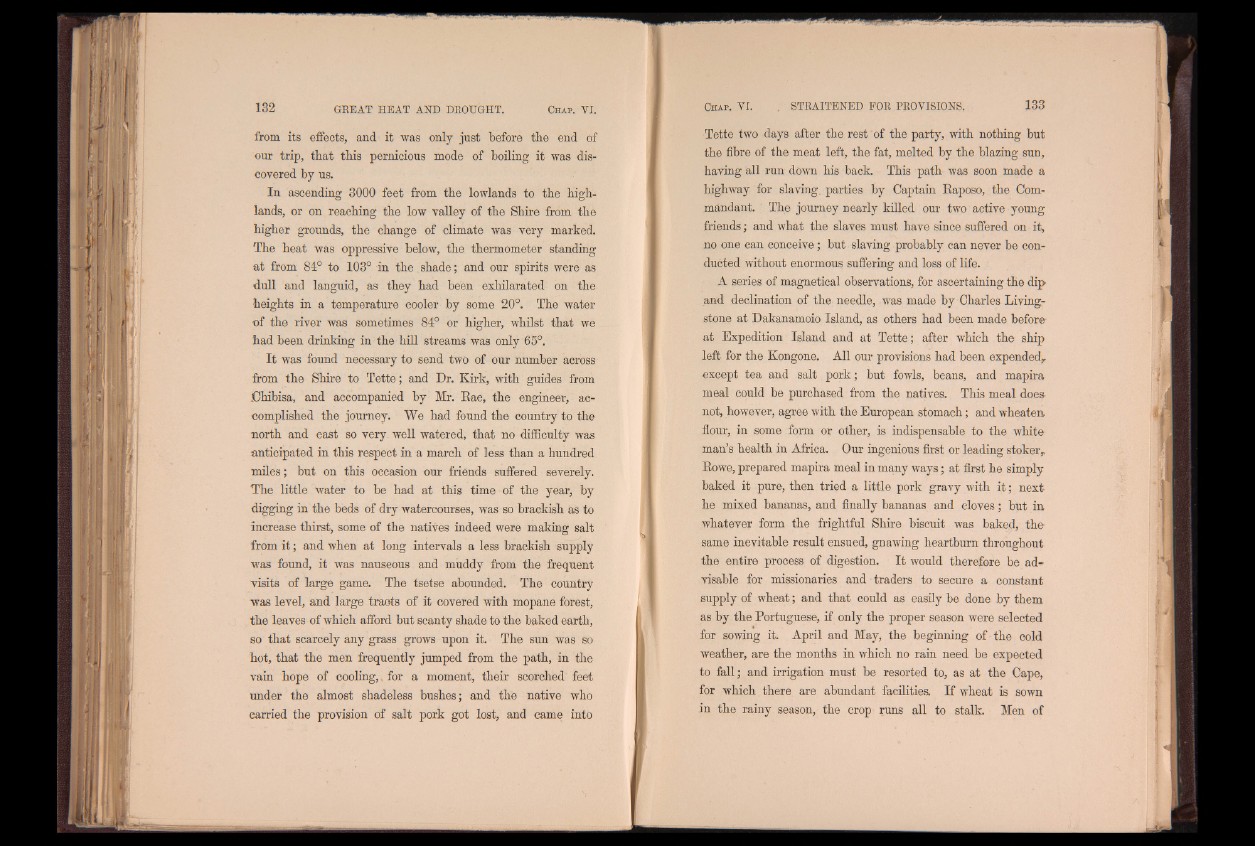
from its effects, and it was only just before the end of
our trip, that this pernicious mode of boiling it was discovered
by us.
In ascending 3000 feet from the lowlands to the highlands,
or on reaching the low valley of the Shire from the
higher grounds, the change of climate was very marked.
The heat was oppressive below, the thermometer standing
at from 84° to 103° in the.shade; and our spirits were as
dull and languid, as they had been exhilarated on the
heights in a temperature cooler by some 20°. The water
of the river was sometimes 84° or higher, whilst that we
had been drinking in the hill streams was only 65°.
I t was found necessary to send two of our number across
from the Shire to Tette; and Dr. Kirk, with guides from
Dhibisa, and accompanied by Mr. Eae, the engineer, accomplished
the journey. We had found the country to the
north and east so very well watered, that no difficulty was
anticipated in this respect in a march of less than a hundred
miles; but on this occasion our friends suffered severely.
The little water to be had at this time of the year, by
digging in the beds of dry watercourses, was so brackish as to
increase thirst, some of the natives indeed were making salt
from i t ; and when at long intervals a less brackish supply
was found, it was nauseous and muddy from the frequent
visits of large game. The tsetse abounded. The country
was level, and large traots of it covered with mopane forest,
the leaves of which afford but scanty shade to the baked earth,
so that scarcely any grass grows upon it. The sun was so
hot, that the men frequently jumped from the path, in the
vain hope of cooling,, for a moment, their scorched feet
under the almost shadeless bushes; and the native who
carried the provision of salt pork got lost, and came into
Tette two days after the rest of the party, with nothing but
the fibre of the meat left, the fat, melted by the blazing sun,
having all run down his back. This path was soon made a
highway for slaving, parties by Captain Raposo, the Commandant.
The journey nearly killed our two active young
friends; and what the slaves must have since suffered on it,
no one can conceive; but slaving probably can never be conducted
without enormous suffering and loss of life.
A series of magnetical observations, for ascertaining the dip
and declination of the needle, was made by Charles Livingstone
at Dakanamoio Island, as others had been made before
at Expedition Island and at Tette; after which the ship
left for the Kongone. All our provisions had been expended,
•except tea and salt pork; but fowls, beans, and mapira
meal could be purchased from the natives. This meal does-
not, however, agree with the European stomach; and wheaten,
flour, in some form or other, is indispensable to the white
man’s health in Africa. Our ingenious first or leading stoker,
Rowe, prepared mapira meal in many ways; at first he simply
baked it pure, then tried a little pork gravy with i t ; next
he mixed bananas, and finally bananas and cloves; but in
whatever form the frightful Shire biscuit was baked, the
same inevitable result ensued, gnawing heartburn throughout
the entire process of digestion. I t would therefore be advisable
for missionaries and traders to secure a constant
supply of wheat; and that could as easily be done by them
as by the Portuguese, if only the proper season were selected
for sowing it. April and May, the beginning of the cold
weather, are the months in which no rain need be expected
to fall; and irrigation must be resorted to, as at the Cape,
for which there are abundant facilities. If wheat is sown
in the rainy season, the crop runs all to stalk. Men of